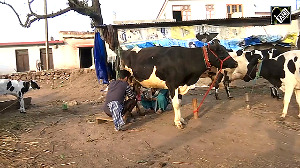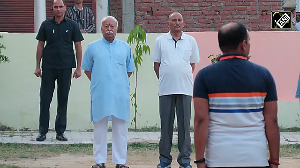Under India's laws bigamy is disallowed and those in breach of the law don't submit affidavits testifying to this status.
However, these candidates have no fear of the law -- and thereby hangs an interesting tale, reports Prakash Bhandari.

Candidates in six Rajasthan assembly constituencies have mentioned in their election affidavit that they have more than one wife.
Of these, four are from the Bharatiya Janata Party and two are from the Congress.
Udai Lal Dangi (Vallabhnagar) Babu Lal Kharari (Jhadol), Dayaram Parmar (Kherawara), Hemant Meena (Pratapgarh) and Kailash Meena (Garhi) are the BJP candidates with more than one wife, while Dayaram Parmar (Kherawara) and Nana Lal Neeman (Ghatol) are the Congress candidates.
Interestingly, only recently the wives of these candidates had observed Karwa Chauth together.
Member of the Lok Sabha from Udaipur, Sarjun Lal Meena, has two wives. In fact, his two wives, Meenaxi and Rajkumari, are sisters. While Meenaxi runs a gas agency, Rajkumari is a teacher.
Under India's laws bigamy is disallowed and those in breach of the law don't submit affidavits testifying to their bigamist status.
However, these candidates have no fear of the law -- and thereby hangs an interesting tale.
But first, a brief lesson in history.
In Rajasthan 25 Vidhan Sabha seats and three Lok Sabha seats are reserved for the scheduled tribes. There are two categories of tribals who qualify.
There are the Bhils, who are Adivasis located in southern Rajasthan's districts of Udaipur, Banswara, Dungarpur and Pratapgarh.
The other tribals are Meenas, agriculturists with no tribal traits, who were given scheduled tribe status because of a Rajasthan government administrative lapse.
While reservations for the Bhils of southern Rajasthan was recommended, because of an administrative lapse in the form of typographic errors it ended in benefitting the agriculturist Meenas as well.
The agriculturist Meenas thrived on the reservation status given to them, and today there are over 200 IAS, IPS, IFS and other civil services officers spread all over the country.
But the Bhils of southern Rajasthan remain backward, and not a single Bhil has so far made it to the civil services.
The Bhils are one of the oldest and most numerous tribal groups in lndia. They were warriors and fought the Mughals under the command of Maharana Pratap.
They played a decisive role in the destiny of many rulers and kingdoms. They have witnessed many an empire rise and crumble and vanish in the cold morgue of history.
As for the bigamy part, it is customary among tribals to have more than one wife and it is permitted by tribal custom.
A Bhil may bring home several wives, if he has the money to pay for them, to boost his prestige among his fellows.
Another reason for having several wives is to swell his workforce.
It may also happen that the first wife has produced no son and so the husband opts for a second wife.
In the tribal areas of southern Rajasthan as many as 50 percent of the tribal men have more than one wife.
The men marry several times for a small amount of money that is paid to the girl's father.
Usually, the second wife lives in the same house and at times two sisters marry the same man.
A number of agriculturist Meenas also have more than one wife, but they have not disclosed it officially, though their community knows it well.
A number of IAS, IPS, IFS and other allied service officers from the agriculturist Meena community have more than one wife.
As most of them come from rural areas they are married early in life, and after becoming IAS and IPS officers they marry educated girls and let their first wives stay in their village, but they look after them by sending money.
Feature Presentation: Aslam Hunani/Rediff.com











 © 2025
© 2025